有关地名的英语成语典故
含地名的英国谚语及其由来

含地名的英国谚语及其由来作者:毛里林来源:《英语学习》2019年第02期随着生活水平的日趋提高,走出国门旅游已成为越来越多国人的选择。
在本文里,笔者欲和大家一起探究一些含地名的英语典故谚语,让读者们在游览海外名胜古迹的同时,还能欣赏趣闻轶事,了解西方文化。
直译为“从中国到秘鲁”。
众所周知,中国在亚洲,而秘鲁却在太平洋另一头的南美洲。
不言而喻,from China to Peru的意思即相当于中文里的“远隔重洋”,也可以理解为“到处,遍天下”的意思。
例如:1)That English is widely used is the fact acknowledged from China to Peru. 英语被广泛使用是举世公认的事实。
2)We have friends from China to Peru. 我们的朋友遍天下。
3)Happiness was from China to Peru when the cheering news came. 这个令人振奋的消息传来后,到处弥漫着快乐的气氛。
虽然不清楚中国和秘鲁为何会出现在同一典故里,但是两国确实有共同点。
中草药是中国人几千年来用以同疾病作斗争的宝贵遗产。
在秘鲁,从清晨喝的草药热饮,到无聊时嚼的可卡叶,可以说,草药在秘鲁人的生活中有着无法替代的地位。
秘鲁位于南美洲西部,西濒太平洋,主要景点有:利马大广场(Lima Grand Square)、黄金博物馆(Gold Museum)、库斯科城(The City of Cuzco)、马丘比丘遗址(Machu Picchu Ruins)等。
其中,利马大广场是秘鲁政治生活历程中许多重要事件的见证,所以秘鲁人视之为国家的骄傲。
广场中央的铜喷泉建于1650年,其四周有总统府、利马市政大厦、大教堂等。
原话为:When in Rome, do as the Romans do. 直译为“在罗马,就按罗马人的方式办。
有关地名的英语成语典故
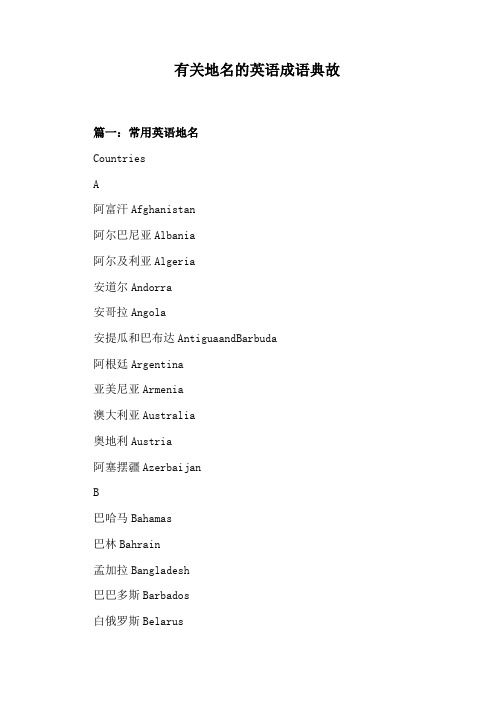
有关地名的英语成语典故篇一:常用英语地名CountriesA阿富汗Afghanistan阿尔巴尼亚Albania阿尔及利亚Algeria安道尔Andorra安哥拉Angola安提瓜和巴布达AntiguaandBarbuda阿根廷Argentina亚美尼亚Armenia澳大利亚Australia奥地利Austria阿塞摆疆AzerbaijanB巴哈马Bahamas巴林Bahrain孟加拉Bangladesh巴巴多斯Barbados白俄罗斯Belarus比利时Belgium/Xtrapage伯利兹Belize贝宁Benin不丹Bhutan玻利维亚Bolivia波斯尼亚和黑塞哥维那BosniaandHerzegovina 博茨瓦纳Botswana巴西Brazil文莱Brunei保加利亚Bulgaria布基纳法索BurkinaFaso布隆迪BurundiC柬埔寨Cambodia喀麦隆Cameroon加拿大Canada佛得角CapeVerde中非CentralAfricanRepublic乍得Chad智利Chile中国China哥伦比亚Colombia科摩罗Comoros刚果(金)Congo(Congo-Kinshasa)刚果Congo哥斯达黎加CostaRica科特迪瓦Coted'Ivoire克罗地亚Croatia古巴Cuba塞浦路斯Cyprus捷克Czech/前捷克斯洛伐克FormerCzechoslovakia D丹麦Denmark吉布提Djibouti多米尼克Dominica多米尼加DominicanRepublicE东帝汶EastTimor厄瓜多尔Ecuador埃及Egypt赤道几内亚EquatorialGuinea厄立特里亚Eritrea爱沙尼亚Estonia埃塞俄比亚Ethiopia欧洲联盟EuropeanUnion(EU)F斐济Fiji芬兰Finland法国FranceG加蓬Gabon冈比亚Gambia格鲁吉亚Georgia德国Germany/前东德FormerEastGermany 加纳Ghana希腊Greece格林纳达Grenada危地马拉Guatemala几内亚比绍Guinea-Bissau几内亚Guinea圭亚那GuyanaH海地Haiti洪都拉斯Honduras匈牙利HungaryI冰岛Iceland印度India印度尼西亚Indonesia伊朗Iran伊拉克Iraq爱尔兰Ireland以色列Israel意大利ItalyJ牙买加Jamaica日本Japan约旦JordanK哈萨克斯坦Kazakhstan 肯尼亚Kenya基里巴斯Kiribati朝鲜Korea(North)韩国Korea(South)科威特Kuwait吉尔吉斯斯坦Kyrgyzstan L老挝Laos拉脱维亚Latvia黎巴嫩Lebanon莱索托Lesotho利比里亚Liberia利比亚Libya列支敦士登Liechtenstein 立陶宛Lithuania卢森堡LuxembourgM马其顿Macedonia马达加斯加Madagascar马拉维Malawi马来西亚Malaysia马尔代夫Maldives马里Mali马尔他Malta马绍尔群岛MarshallIslands 毛里塔尼亚Mauritania毛里求斯Mauritius墨西哥Mexico麦克罗尼西亚Micronesia摩尔多瓦Moldova摩纳哥Monaco蒙古Mongolia摩洛哥Morocco莫桑比克Mozambique缅甸MyanmarN纳米比亚Namibia北大西洋公约组织NorthAtlanticTreatyOrganization(NATO)瑙鲁Nauru尼泊尔Nepal荷兰Netherlands新西兰NewZealand尼加拉瓜Nicaragua尼日尔Niger尼日利亚Nigeria挪威NorwayO阿曼OmanP巴基斯坦Pakistan帕劳Palau巴勒斯坦Palestine巴拿马Panama巴布亚新几内亚PapuaNewGuinea巴拉圭Paraguay秘鲁Peru菲律宾Philippines波兰Poland葡萄牙PortugalQ卡塔尔QatarR罗马尼亚Romania俄罗斯Russia/前苏联FormerUSSR卢旺达RwandaS圣基茨和尼维斯SaintKitts-Nevis圣卢西亚SaintLucia圣文森特和格林纳丁斯SaintVincentandtheGrenadines 萨尔瓦多ElSalvador萨摩亚Samoa圣马力诺SanMarino圣多美和普林西比SaoTomeandPrincipe沙特阿拉伯SaudiArabia塞内加尔Senegal塞舌尔Seychelles塞拉利昂SierraLeone新加坡Singapore斯洛伐克Slovakia斯洛文尼亚Slovenia所罗门群岛SolomonIslands索马里Somalia南非SouthAfrica西班牙Spain斯里兰卡SriLanka苏丹Sudan苏里南Suriname斯威士兰Swaziland瑞典Sweden瑞士Switzerland叙利亚SyriaT塔吉克斯坦Tajikistan坦桑尼亚Tanzania泰国Thailand多哥Togo汤加Tonga特立尼达和多巴哥TrinidadandTobago 突尼斯Tunisia土耳其Turkey土库曼斯坦Turkmenistan图瓦卢TuvaluU乌干达Uganda乌克兰Ukraine阿拉伯联合酋长国UnitedArabEmirates英国UnitedKingdom/北爱尔兰NorthernIreland联合国组织UnitedNationsOrganization(UNO)乌拉圭Uruguay美国UnitedStatesofAmerica(USA)/波多黎各PuertoRico乌兹别克斯坦UzbekistanV瓦努阿图Vanuatu梵蒂冈VaticanCity委内瑞拉Venezuela越南Vietnam(formerlyNorthVietnam)/前南越FormerSouthVietnamY也门Yemen/前北也门FormerNorthYemen/前南也门FormerSouthYemen南斯拉夫Yugoslavia/前南斯拉夫FormerYugoslavia篇二:有关地名成语上有关地名的成语(上)1.五湖四海:五湖指波阳湖、洞庭湖、洪择湖、太湖、巢湖五大湖泊;四海指东海、西海、南海、北海。
英语俚语中的地名
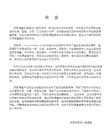
meet ones Waterloo 倒霉遭受惨败的地方。遭遇滑铁卢,对一个人来说,后果不堪设想。无怪据说二战期间,在准备诺曼底反攻时,温斯顿丘吉尔和随员冒雨去某地开会,其随员因路滑而摔了一跤,脱口说一句To meet Waterloo!丘吉尔竟联想到拿破仑兵败滑铁卢的典故,恼怒地斥责他 胡说!我要去凯旋门呢! 请看例句 No wonder they met their Waterloo in this match. They hadnt been trained for months! 难怪他们这场比赛输得一塌糊涂,他们已经好几个月没训练了!be Greek to someone不知道。英国人一般都不懂希腊语。这句话的直译是 对于某人来说,这是希腊语。引申为不明白。请看例句 He is a very famous artist, but physics is Greek to him. 他是一位著名的艺术家,但是对物理一窍不通。Greek kalends calends幽默、诙谐的表达永远不。Kalends 是罗马日历的第一天。古希腊不用罗马日历,所以永远不会有这一天。请看例句 A: When will you finish your work and leave the computer alone? 你什么时候才能结束工作不再用电脑? B: At the Greek kalends. 永远没有那一天。在英语中,很多表达都与地点有关。这些表达琅琅上口,生动活泼,并且大多有着自己的故事。下面就为您介绍几个这样的表达,快来看看你和他们是否相识吧!castle in Spain 西班牙城堡,比喻幻想,梦想,相当于汉语中的空中楼阁。在中世纪某一时期,西班牙是一个颇富浪漫色彩的国家,过于浪漫就成了梦幻啦。请看例句 Dont trust him any more. He is always living in a castle in Spain as a daydreamer. 别再相信他了。他是个一直住在空中阁楼里的空想家。set the Thames on fire 做出惊人之举 取得非凡成就。火烧泰晤士河,这是何等伟大的壮举!但是这句成语经常是用来表示反义的,指那些人对某事只是夸下海口,而不是真正想去做。请看例句 Jack won the champion of the Spelling Bee? Youre kidding! A person who hardly reads books can not set the Thames on fire! Jack赢了拼写比赛的冠军?你开什么玩笑!一个不怎么看书的人不会有这么大的成功!from China to Peru 到处。它的意义非常明白,指从世界的这一边到世界的那一边,当然就是遍布各地,到处啦。请看例句 Happiness was from China to Peru when the cheering news came..这个令人振奋的消息传来后,快乐弥漫在各处。Between Scylla and Charybdis 锡拉和卡津布迪斯之间,即在两个同样危险的事物之间,或是腹背受敌,进退两难的意思。锡拉是传说中生活在意大利岩石上的怪兽,卡津布迪斯是住在海峡中一端经常产生旋涡的怪兽。水手为了躲避其中一个的危害,而常又落入另一个灾难。意大利这一方的海角叫凯尼斯Caenys,西西里岛那一方的海角叫皮罗鲁姆Pelorum。请看例句 He was between Scylla and Charybdis, for his company had betrayed him.他的同伴背叛了他,至使他腹背受敌。When in Rome, do as the Romans do. 在罗马,就按罗马人的方式办。和我们入乡随俗的意思一样。请看例句 Take it easy and have a try! You know, when in Rome, do as the Romans do. 放轻松点,试一试吧!你知道,要入乡随俗。carry coals to Newcastle 做徒劳多余的事。纽卡斯尔盛产煤,送煤到那里,岂不是多此一举?请看例句 You are carrying coals to Newcastle if you water those flowers right now.The rain is just around the corner. 你现在浇花就是多此一举了。马上就要下雨了。
英语专有名词成语
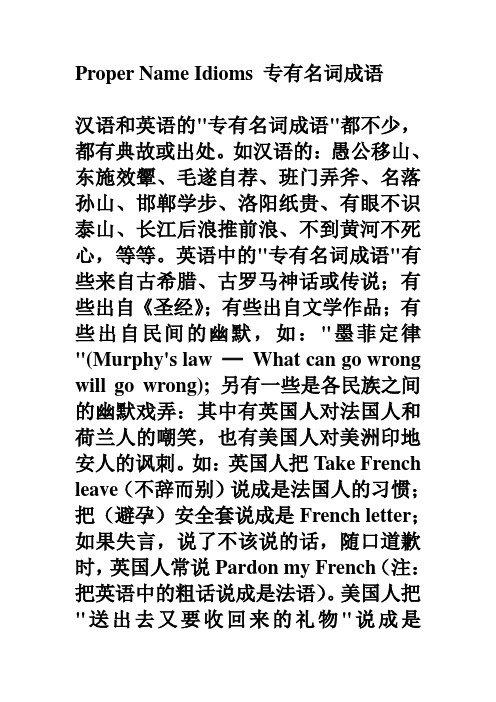
Proper Name Idioms 专有名词成语汉语和英语的"专有名词成语"都不少,都有典故或出处。
如汉语的:愚公移山、东施效颦、毛遂自荐、班门弄斧、名落孙山、邯郸学步、洛阳纸贵、有眼不识泰山、长江后浪推前浪、不到黄河不死心,等等。
英语中的"专有名词成语"有些来自古希腊、古罗马神话或传说;有些出自《圣经》;有些出自文学作品;有些出自民间的幽默,如:"墨菲定律"(Murphy's law ─What can go wrong will go wrong); 另有一些是各民族之间的幽默戏弄:其中有英国人对法国人和荷兰人的嘲笑,也有美国人对美洲印地安人的讽刺。
如:英国人把Take French leave(不辞而别)说成是法国人的习惯;把(避孕)安全套说成是French letter;如果失言,说了不该说的话,随口道歉时,英国人常说Pardon my French(注:把英语中的粗话说成是法语)。
美国人把"送出去又要收回来的礼物"说成是Indian gift(印第安人的礼物)。
本单元的英语成语跟"人名"和"地名"等专有名词有关。
关键词包括:Achilles ― Blarney ― Damocles ― Humphrey ― Dutch ― French ― Freudian ― Garrison ― Gordian ― Greek ― Herculean ― Indian―Jack―Job― John ― Jones ― Newcastle ― Pandora ― Peter ― Penelope ― Pyrrhic ― Reilly ― Roland ― Rome ― Rubicon ― Sally ― Sydney ― Thames ― Waterloo1. Achilles' heel字面意思:阿基琉斯的脚后跟。
37个有用的英语成语典故

37个英语成语典故(一)源自古希腊罗马神话传说的13个成语典故1.An Apple of Discord争斗之源;不和之因;祸根An Apple of Discord直译为“纠纷的苹果”,出自荷马史诗Iliad中的希腊神话故事传说希腊阿耳戈英雄(Argonaut)珀琉斯(Peleus)和爱琴海海神涅柔斯的女儿西蒂斯(Thetis)在珀利翁山举行婚礼,大摆宴席。
他们邀请了奥林匹斯上(Olympus)的诸神参加喜筵,不知是有意还是无心,惟独没有邀请掌管争执的女神厄里斯(Eris)。
这位女神恼羞成怒,决定在这次喜筵上制造不和。
于是,她不请自来,并悄悄在筵席上放了一个金苹果,上面镌刻着“属于最美者”几个字。
天后赫拉(Hera),智慧女神雅典娜(Athena)、爱与美之神阿芙罗狄蒂(Aphrodite),都自以为最美,应得金苹果,获得“最美者”称号。
她们争执不下,闹到众神之父宙斯(Zeus)那里,但宙斯碍于难言之隐,不愿偏袒任何一方,就要她们去找特洛伊的王子帕里斯(Paris)评判。
三位女神为了获得金苹果,都各自私许帕里斯以某种好处:赫拉许给他以广袤国土和掌握富饶财宝的权利,雅典娜许以文武全才和胜利的荣誉,阿芙罗狄蒂则许他成为世界上最美艳女子的丈夫。
年青的帕里斯在富贵、荣誉和美女之间选择了后者,便把金苹果判给爱与美之神。
为此,赫拉和雅典娜怀恨帕里斯,连带也憎恨整个特洛伊人。
后来阿芙罗狄蒂为了履行诺言,帮助帕里斯拐走了斯巴达国王墨涅俄斯的王后---绝世美女海伦(Helen),从而引起了历时10年的特洛伊战争。
不和女神厄里斯丢下的那个苹果,不仅成了天上3位女神之间不和的根源,而且也成为了人间2个民族之间战争的起因。
因此,在英语中产生了an apple of discord这个成语,常用来比喻any subject of disagreement and contention;the root of the t rouble;dispute等意义这个成语最初为公元2世纪时的古罗马历史学家马克·朱里·尤斯丁(Marcus Juninus Justinus)所使用,后来广泛的流传到欧洲许多语言中去,成为了一个国际性成语。
介绍一些含有地名的成语及其典故

格 兰 情 侣 可在 苏格 兰 这
3
t
o
小镇 成 婚
r n e
ha
V c
k is
s e
d B la
y
St
()n 。
.
说 奉 承 话 花 言巧 语
. .
相传爱 尔共
,
.
B la r
e n
in
y
。
城 堡 电有 块 石 头 吻 厂 此 石 后 就 会变 得 口 齿伶 俐
a r e
善 f 奉 承 拍 马 花 言巧 语
此 语 始 于英国 国 王 查理 捕 的保 王党 人
2
.
匹和 国 会之 间 的 内 战
`
一
y
。
,
当时 被
: o 曾被 监 禁 在 位 J 英 格 兰 中 部 的 〔 v t n a
e
t n
r
o
ff
t
a
o
r e (二
Gr e e n私奔.(; r。、 n
(行c
n
系 英 格 兰和 苏 洛 兰边 境 的 一 个 小 镇 未 到 结 婚年 龄 的 英
连
t ()
b
e
/e
n
d
u
p
C
y
St
r e e
t
破产
St t e r e
.
a y 英 国 的破 产 法 庭 坐 落 在 C r c
。
上这 条 街 上 的 破 产 法 庭就 意 味 着
破产 大 难 临头 仍歌 舞 升 平 传 说 占 罗 马暴 君 尼 禄 在 罗 马 被 焚 毁 时 仍 耽 于 享 乐
6 B, 7 .
源于地名的英语词汇
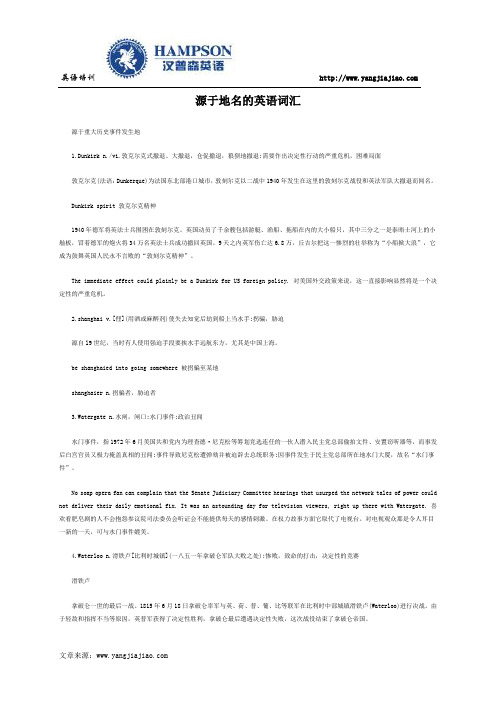
英语培训源于地名的英语词汇源于重大历史事件发生地1.Dunkirk n./vi.敦克尔克式撤退、大撤退,仓促撤退,狼狈地撤退;需要作出决定性行动的严重危机,困难局面敦克尔克(法语:Dunkerque)为法国东北部港口城市,敦刻尔克以二战中1940年发生在这里的敦刻尔克战役和英法军队大撤退而闻名。
Dunkirk spirit 敦克尔克精神1940年德军将英法士兵围困在敦刻尔克。
英国动员了千余艘包括游艇、渔船、拖船在内的大小船只,其中三分之一是泰晤士河上的小舢板,冒着德军的炮火将34万名英法士兵成功撤回英国。
9天之内英军伤亡达6.8万,丘吉尔把这一惨烈的壮举称为“小船掀大浪”,它成为鼓舞英国人民永不言败的“敦刻尔克精神”。
The immediate effect could plainly be a Dunkirk for US foreign policy. 对美国外交政策来说,这一直接影响显然将是一个决定性的严重危机。
2.shanghai v.[俚](用酒或麻醉剂)使失去知觉后劫到船上当水手;拐骗,胁迫源自l9世纪,当时有人使用强迫手段要挟水手远航东方,尤其是中国上海。
be shanghaied into going somewhere 被拐骗至某地shanghaier n.拐骗者,胁迫者3.Watergate n.水闸,闸口;水门事件;政治丑闻水门事件,指1972年6月美国共和党内为理查德·尼克松等筹划竞选连任的一伙人潜入民主党总部偷拍文件、安置窃听器等,而事发后白宫官员又极力掩盖真相的丑闻;事件导致尼克松遭弹劾并被迫辞去总统职务;因事件发生于民主党总部所在地水门大厦,故名“水门事件”。
No soap opera fan can complain that the Senate Judiciary Committee hearings that usurped the network tales of power could not deliver their daily emotional fix. It was an astounding day for television viewers, right up there with Watergate. 喜欢看肥皂剧的人不会抱怨参议院司法委员会听证会不能提供每天的感情刺激。
最新-有关地名的英语成语典故 精品
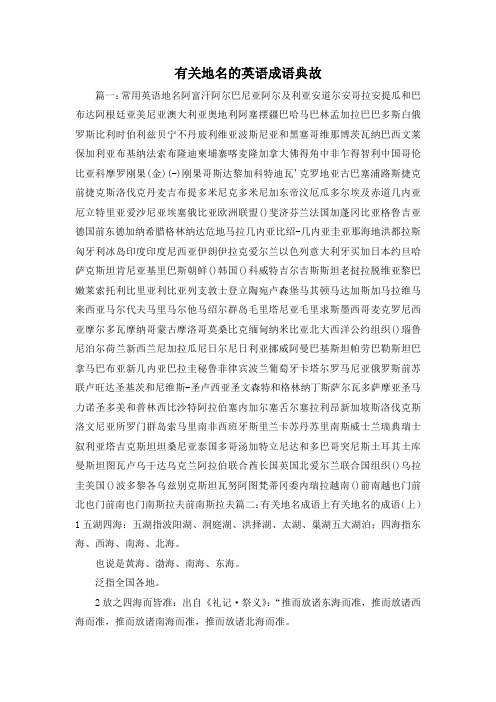
有关地名的英语成语典故篇一:常用英语地名阿富汗阿尔巴尼亚阿尔及利亚安道尔安哥拉安提瓜和巴布达阿根廷亚美尼亚澳大利亚奥地利阿塞摆疆巴哈马巴林孟加拉巴巴多斯白俄罗斯比利时伯利兹贝宁不丹玻利维亚波斯尼亚和黑塞哥维那博茨瓦纳巴西文莱保加利亚布基纳法索布隆迪柬埔寨喀麦隆加拿大佛得角中非乍得智利中国哥伦比亚科摩罗刚果(金)(-)刚果哥斯达黎加科特迪瓦'克罗地亚古巴塞浦路斯捷克前捷克斯洛伐克丹麦吉布提多米尼克多米尼加东帝汶厄瓜多尔埃及赤道几内亚厄立特里亚爱沙尼亚埃塞俄比亚欧洲联盟()斐济芬兰法国加蓬冈比亚格鲁吉亚德国前东德加纳希腊格林纳达危地马拉几内亚比绍-几内亚圭亚那海地洪都拉斯匈牙利冰岛印度印度尼西亚伊朗伊拉克爱尔兰以色列意大利牙买加日本约旦哈萨克斯坦肯尼亚基里巴斯朝鲜()韩国()科威特吉尔吉斯斯坦老挝拉脱维亚黎巴嫩莱索托利比里亚利比亚列支敦士登立陶宛卢森堡马其顿马达加斯加马拉维马来西亚马尔代夫马里马尔他马绍尔群岛毛里塔尼亚毛里求斯墨西哥麦克罗尼西亚摩尔多瓦摩纳哥蒙古摩洛哥莫桑比克缅甸纳米比亚北大西洋公约组织()瑙鲁尼泊尔荷兰新西兰尼加拉瓜尼日尔尼日利亚挪威阿曼巴基斯坦帕劳巴勒斯坦巴拿马巴布亚新几内亚巴拉圭秘鲁菲律宾波兰葡萄牙卡塔尔罗马尼亚俄罗斯前苏联卢旺达圣基茨和尼维斯-圣卢西亚圣文森特和格林纳丁斯萨尔瓦多萨摩亚圣马力诺圣多美和普林西比沙特阿拉伯塞内加尔塞舌尔塞拉利昂新加坡斯洛伐克斯洛文尼亚所罗门群岛索马里南非西班牙斯里兰卡苏丹苏里南斯威士兰瑞典瑞士叙利亚塔吉克斯坦坦桑尼亚泰国多哥汤加特立尼达和多巴哥突尼斯土耳其土库曼斯坦图瓦卢乌干达乌克兰阿拉伯联合酋长国英国北爱尔兰联合国组织()乌拉圭美国()波多黎各乌兹别克斯坦瓦努阿图梵蒂冈委内瑞拉越南()前南越也门前北也门前南也门南斯拉夫前南斯拉夫篇二:有关地名成语上有关地名的成语(上)1五湖四海:五湖指波阳湖、洞庭湖、洪择湖、太湖、巢湖五大湖泊;四海指东海、西海、南海、北海。
谈由英语地名人名而来的英语成语-精品文档资料

谈由英语地名人名而来的英语成语英语中也有许多含有地名的成语。
其中有些成语的产生与这些地方所具有的某些显著特征有关。
比如:carry coal to Newcastle,Newcastle是英国的产煤之乡,把煤运到这里来乃是“多此一举”、“徒劳无益”。
和这个习语意思相同的另一个英语习语是“carry owls to Athens”(把猫头鹰带到雅典)。
也有一些习语来自与地名相关的重大历史事件,像meet one's Waterloo。
历史上拿破仑是一位伟大的军事家,他领导的军队曾一度征服欧洲,所到之处势如破竹,有“不败之师”之称。
但在1815年6月与德奥匈联军的滑铁卢大战中惨遭失败。
后来人们便用to meet one's Waterloo表示“遭到致命的打击”或“碰上了自己的厄运”。
你知道Alaska purchase的含义吗?1867年3月美国国务卿西沃德与俄国驻美公使签订条约,以两美分一英亩的价格购买了俄在北美的58万平方英里的土地(今美国阿拉斯加州),使Alaska purchase成为历史上有名的“大宗廉价交易”。
还有一些和地名相关的习语是形成于和该地相关的风俗和趣事。
Fleet Marriage是“秘密结婚”的意思。
Fleet是历史上伦敦的一个小教堂,在此一度举行过许多没有公告、没有许可证的秘密婚礼,其对象主要是水手和服刑人员。
无独有偶,Gretna Green Marriage则是“私奔结婚”的意思,它是“Fleet Marriage”在1753年被废除后应运而生的。
Gretna Green是苏格兰毗连英格兰的一个村庄。
在这里,从英格兰私奔而来的青年男女没有任何证书和仪式就可以合法结为夫妇。
尽管到1940年7月,这种宣告式的婚礼不再合法,但仍然吸引着一对对的有情人前往该地,因为未成年的男女未经父母同意仍可在Gretna Green村结婚。
更有趣的是在美国内华达州有一个叫Reno(雷诺)的小镇,按照当地风俗,夫妻离婚不需办任何官方手续,外地来的夫妻只要在此住上三个月,就算离婚告成。
地名文化与汉英翻译

•
Hale Waihona Puke 1.都说Pearl Harbor是“ 珍珠港”的 意思,其实还有更中土的翻译: 蚌埠。 2.都说Greenland是“格陵兰”的意思, 其实还有更中土的翻译:青岛。 3.都说Deep River是宇多田光的专辑, 其实它还有另外一个神奇的名字叫“深 圳”。 都说Newfoundland是纽芬兰,其实有更北 京的翻译:新发地。 4.都说rock hometown是“摇滚之乡” 的 意思,其实还有更中土的翻译:石家庄。 5.都说New York是“纽约”的意思,其 实还有更中土的翻译:新乡。 6.都说Red River Valley是“红河谷” 的意思,其实还有更中土的翻译:丹江口。
地区
• 陕西省 Shaanxi Province 山东省Shandong Province • 陕县Shanxian County(山西) 六合县Luhe County(江苏) • 荥阳市Xingyang City(河南) 六盘水市Liupanshui City(贵州) • 柏城镇 Bocheng Town(山东高密市) 单城镇 Dancheng Town(黑龙江双城县)
外国国名来历
智利:Chile 在印加系语言中,Chile 为“chilly寒冷”的意 思。原来居住此地的阿劳干人认为这个地方比印 加帝国纬度高,所以称为“寒冷”。 格陵兰:Greenland 根据北欧神话史诗萨迦的记载,红胡子埃里克 森因为犯谋杀罪而从冰岛流亡至此。埃里克森一 家及其奴隶向西北航行,以探寻传说存在在那里 的陆地。当他发现了天边地平线上的一抹绿色, 于是便定居下来,给该岛取名 Greenland,意为 “绿色的土地”,以吸引更多的移民。 新加坡:Singapore Singapore新加坡是一个城市国家,是梵语“狮 城”之谐音。在梵文中,Singa 意即“狮子”; pore 意即“城堡”。由于季节的影响,海运的船 舶经常云集在此,所以逐渐成为一个船舶停泊的 商埠。
邯郸市成语之乡英语作文
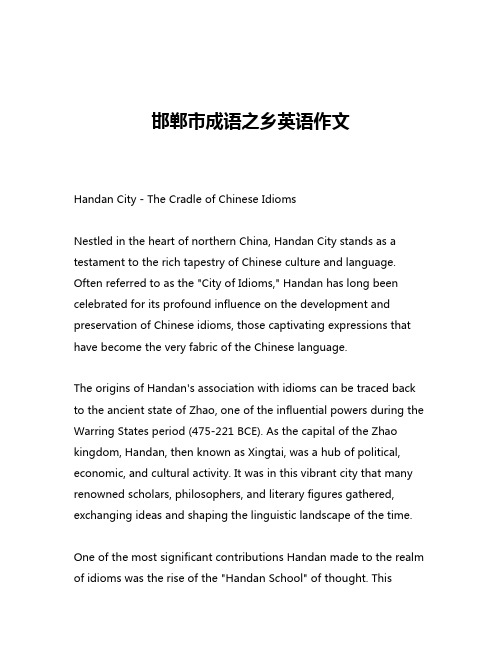
邯郸市成语之乡英语作文Handan City - The Cradle of Chinese IdiomsNestled in the heart of northern China, Handan City stands as a testament to the rich tapestry of Chinese culture and language. Often referred to as the "City of Idioms," Handan has long been celebrated for its profound influence on the development and preservation of Chinese idioms, those captivating expressions that have become the very fabric of the Chinese language.The origins of Handan's association with idioms can be traced back to the ancient state of Zhao, one of the influential powers during the Warring States period (475-221 BCE). As the capital of the Zhao kingdom, Handan, then known as Xingtai, was a hub of political, economic, and cultural activity. It was in this vibrant city that many renowned scholars, philosophers, and literary figures gathered, exchanging ideas and shaping the linguistic landscape of the time.One of the most significant contributions Handan made to the realm of idioms was the rise of the "Handan School" of thought. Thisintellectual movement, centered in the city, focused on the study and refinement of Chinese language and literature, with a particular emphasis on the nuances and subtleties of idiomatic expressions. The scholars of the Handan School delved deep into the origins, meanings, and usage of these linguistic gems, preserving and disseminating their knowledge through extensive writings and teachings.The impact of the Handan School can still be felt today, as many of the idioms we cherish in the Chinese language have their roots in the city's rich linguistic heritage. From the poetic "Handan Clouds," which evokes the ethereal beauty of the city's skyline, to the pragmatic "Handan Straw," which symbolizes the importance of practical solutions, these idioms have become integral to the way Chinese people communicate and express themselves.Beyond its academic and literary contributions, Handan's role in the preservation and evolution of idioms is also deeply ingrained in its cultural traditions and local folklore. The city's vibrant festivals, historic landmarks, and unique customs have all served as inspiration for the creation and perpetuation of countless idioms over the centuries.One such example is the "Handan Lantern Festival," an annual celebration that pays homage to the city's long-standing associationwith the art of lantern-making. The intricate designs and captivating displays of these lanterns have given rise to idioms like "Handan Lanterns Shine Brightly," which celebrates the radiance and beauty of the festival. Similarly, the city's renowned "Handan Noodles," a local culinary delight, have inspired the idiom "Handan Noodles Entangle the Heart," reflecting the delicious and irresistible nature of this iconic dish.Moreover, Handan's rich history and cultural landmarks have also contributed to the city's idiomatic legacy. The "Handan Crossroads,"a bustling intersection that has witnessed the ebb and flow of human activity for millennia, has given rise to the idiom "Handan Crossroads, Endless Streams of People," capturing the constant movement and vitality of the city. Similarly, the "Handan Pavilion," a historic structure overlooking the Hutuo River, has inspired the idiom "Handan Pavilion, Overlooking the Flowing River," which evokes a sense of tranquility and contemplation.Beyond its linguistic and cultural significance, Handan's status as the "City of Idioms" has also had a profound impact on the city's economic and tourism development. The city has capitalized on its unique identity, showcasing its rich idiomatic heritage through various cultural festivals, exhibitions, and educational programs. Visitors from around the world flock to Handan to immerse themselves in the city's linguistic legacy, participating in workshops,guided tours, and interactive experiences that celebrate the art of Chinese idioms.The economic benefits of Handan's "City of Idioms" branding have also been significant. The city has leveraged its reputation to attract investment in the cultural and creative industries, fostering the growth of businesses focused on the preservation, interpretation, and commercialization of Chinese idioms. From publishing houses and language academies to artisanal workshops and souvenir shops, Handan's idiomatic economy has become a thriving engine of local development.In recent years, the city has also taken steps to further cement its status as the "City of Idioms" by establishing the Handan Idiom Research Institute, a dedicated institution that conducts in-depth studies on the origins, evolution, and usage of Chinese idioms. This institution has become a hub of scholarly activity, attracting researchers and linguists from around the world to collaborate on projects that deepen our understanding of this rich linguistic heritage.As Handan continues to evolve and adapt to the demands of the modern world, its unwavering commitment to the preservation and promotion of Chinese idioms remains a testament to the city's enduring cultural identity. The "City of Idioms" has become a beaconof linguistic pride, a place where the timeless wisdom and beauty of the Chinese language are celebrated and shared with the world.In conclusion, Handan's status as the "City of Idioms" is a testament to the profound impact it has had on the development and preservation of one of the most captivating aspects of the Chinese language. From its historical roots in the Handan School to its vibrant cultural traditions and economic initiatives, the city has become a living embodiment of the richness and complexity of Chinese idioms. As we explore the linguistic wonders of Handan, we gain a deeper appreciation for the enduring power of language to shape our understanding of the world and our place within it.。
漫谈英语中以地名构成的成语

文 旭
一次佣然 的机会 么这个成语有 个城市
.
,
笔者读 到 了这样一 个成语 之意呢 ? 原来
”
:
0 9
t o
R “ 。 ( 离婚 )
.
为什
.
离婚
.
”
R
e
助
, 。
( 离诺 ) 是 典国内华达 州 西部的一 只须在该市住满三 个月
, .
有
.
“
离姻城市
t o R
之称
,
凡 欲离婚者
“
即 可离
旅
_
因此
o g
o 就 有 离婚 n
”
之意
英语 中象这 样包 含一水地 名的成语虽然不多
但 要其正理 解其含义 非轻 而
.
肠举之事刀只 有对这些 成语的来 龙去脉有所 了解才行
t C l’ o O a N 挥c a s lt
, “
例如
:
c川
险y
.
(或 “ 叼 ) 素 以产煤着
。
其中一种 说法是
.
、
:
据说 以前有个时 期
f
.
考文垂的市 民特别厌 恶 军 人
。
把
接近军人
同
“
军人打交道
.
看作极不光彩的 事
.
尤其是 妇女
,
,
只要被人
.
.
见 限军 人谈话
,
就 会立即受到 效止
由于 流传着这样一 种社会风气 因此 这个 成语有
r lo e
: o
“
军
人一且彼派往考文垂 去驻 扎
【优质文档】快活之城和罪恶之城英语词汇典故-word范文 (2页)

【优质文档】快活之城和罪恶之城英语词汇典故-word范文本文部分内容来自网络整理,本司不为其真实性负责,如有异议或侵权请及时联系,本司将立即删除!== 本文为word格式,下载后可方便编辑和修改! ==快活之城和罪恶之城英语词汇典故The Big Easy and Sin CityNow, the VOA Special English program Words and Their Stories.Many cities have interesting nicknames. Nicknames can help establish the identity of a city. They can also spread pride amongits citizens.New Orleans, Louisiana probably has more nicknames than any other American city. One web site lists more than twenty nicknames. The most famous is "The Big Easy." It describes the gentle, slow andeasy-going way of life in New Orleans.So how did the city get this nickname? In the early 1900s there was a dance hall in New Orleans called "The Big Easy." But the nickname did not become famous until the early 1970s. That was when a Louisiana newspaper writer began calling New Orleans by this name. She compared the easy-going way of life there to the hurried pace of life in New York City.In 1970, James Conaway wrote a crime novel called "The Big Easy." The story was set in New Orleans. In 1987, that book was made into a film which made the nickname even more popular.New Orleans has other nicknames. One of them is "The Crescent City." During the 19th century, new neighborhoods expanded out from what is now known as the French Quarter. These areas followed the great curve of the Mississippi River, giving New Orleans the shape of a crescent.Another nickname is "The Birthplace of Jazz," because that kind of music started in New Orleans. It is also called "Mardi Gras City" for the wild celebrations and parades that take place there every year. And, there is a nickname that uses the short way to write New。
高山流水 (gāo shān liú shuǐ)-英文版成语典故
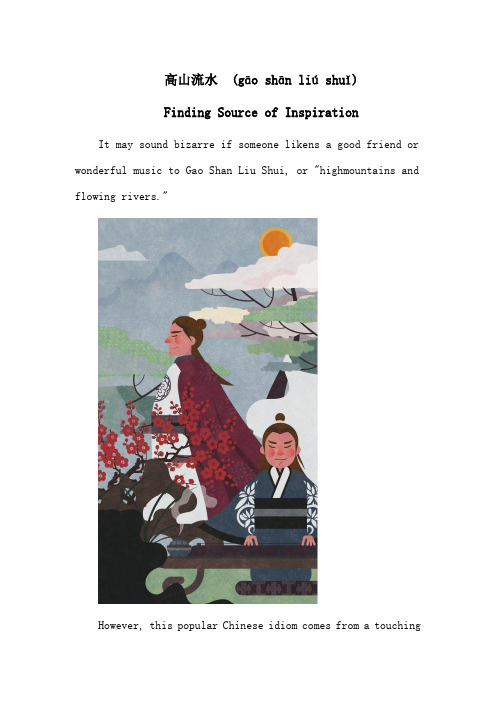
高山流水(gāo shān liú shuǐ)Finding Source of Inspiration It may sound bizarre if someone likens a good friend or wonderful music to Gao Shan Liu Shui, or "highmountains and flowing rivers."However, this popular Chinese idiom comes from a touchingstory about Yu Boya, a legendary virtuoso of guqin(a seven-stringed plucked instrument similar to a zither).Yu lived during the Spring and Autumn Period (770-476 BC) and when he was young, Yu loved playing guqin.He later became a student of Cheng Lian, the best guqin player of the time.Under Cheng's tutoring, Yu made remarkable progress and after three years of practice he had almostmastered the instrument.However, Yu felt that he still wasn't a real guqinvirtuoso and could not use it to express his feelings freely.One day, Cheng told his student: "I have taught you whatever I know, but I can see that you aren't quitesatisfied. So, I'll recommend you to another teacher who can bring your playing to perfection."Next morning, Cheng took Yu to the top of a mountain cliff overlooking the sea. "You wait here and your newinstructor will arrive in a few minutes." Then Cheng went away leaving Yu aloneon the top of the mountain.Yu waited and waited, but no one showed up. Then, gradually, he became enthralled by the sound of the seawaves crashing on the rocks below and the singing of the birds and whispering leaves in the nearby woods.When the sun began to set, it suddenly dawned upon Yu that the new instructor recommended by Cheng wasnone other than nature herself. Yu realized that only by learning from nature could he gain virtuosity of theinstrument. So, he found an inexhaustible source of inspiration and energy.Yu finally reached the level of perfection he had sought and became the best guqinplayer of his time. Butbecause of the profundity of his musical works, Yu found few people who could really understand them. Onlyhis bosom friend, Zhong Ziqi, could actually appreciate his talent and performances.When Yu was playing a new tune one day, Zhong became very excited. He said: "It's wonderful, I can see loftyMount Tai in front of me." Then Yu played another tune and Zhong clapped his hands, saying: "Bravo! It's justas melodious as the flowing rivers."Since then, people use "high mountains and flowing rivers" to describe a soul mate like Zhong Ziqi orwonderful music such as the works created by Yu Boya.。
中华成语故事英语版世外桃源_成语典故素材

中华成语故事英语版世外桃源During the Eastern Jin Dynasty, there was an old fisherman in Wuling. One day, he took his boat out to go fishing. As the boat floated downstream, the fisherman lost his way. Suddenly, a beautiful forest of peach trees with flowers in full bloom caught his eyes. He carried on sailing to the end of the forest where he found a mountain with a small cave at its foot. After the fisherman walked through the cave, a new world opened up before him. The people seemed happy and gentle, and lived peaceful lives with no arguments or disputes. The old rested quietly while the young played happily. Unlike the world东晋年间,武陵有一个老渔夫。
一天,他驾着渔船出去打鱼。
船沿着溪水行驶,老渔夫不知怎么迷了路。
忽然,一片美丽的桃花林出现在他眼前。
渔夫觉得很奇怪,继续往前寻找桃花林的尽头。
树林的尽头是一座山,山脚下有个小洞。
渔夫穿过了山洞,竟然看到了另外一个世界。
outside the cave, there was no conflict or turbulence. When they saw the fisherman, the people asked him not to tell others what he had seen there.那里的人们过着幸福安宁的生活,大家和睦相处,没有纷争,老人们安静地休息,儿童愉快地玩耍,没有外界那样动荡不安。
英语 成语故事 南辕北辙
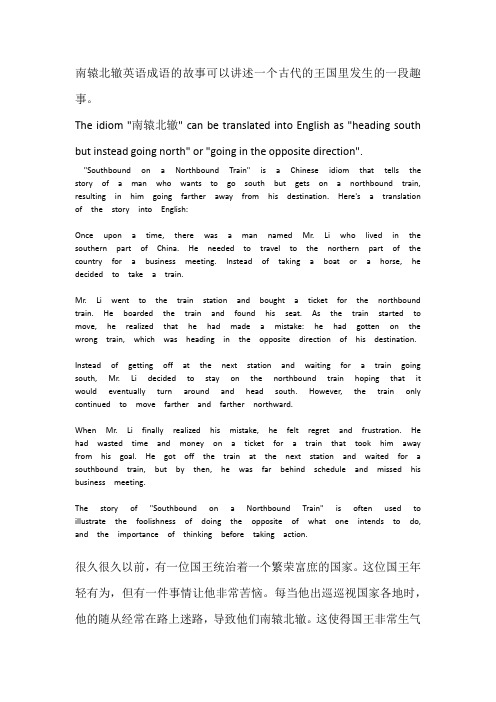
南辕北辙英语成语的故事可以讲述一个古代的王国里发生的一段趣事。
The idiom "南辕北辙" can be translated into English as "heading south but instead going north" or "going in the opposite direction"."Southbound on a Northbound Train" is a Chinese idiom that tells the story of a man who wants to go south but gets on a northbound train, resulting in him going farther away from his destination. Here's a translation of the story into English:Once upon a time, there was a man named Mr. Li who lived in the southern part of China. He needed to travel to the northern part of the country for a business meeting. Instead of taking a boat or a horse, he decided to take a train.Mr. Li went to the train station and bought a ticket for the northbound train. He boarded the train and found his seat. As the train started to move, he realized that he had made a mistake: he had gotten on the wrong train, which was heading in the opposite direction of his destination.Instead of getting off at the next station and waiting for a train going south, Mr. Li decided to stay on the northbound train hoping that it would eventually turn around and head south. However, the train only continued to move farther and farther northward.When Mr. Li finally realized his mistake, he felt regret and frustration. He had wasted time and money on a ticket for a train that took him away from his goal. He got off the train at the next station and waited for a southbound train, but by then, he was far behind schedule and missed his business meeting.The story of "Southbound on a Northbound Train" is often used to illustrate the foolishness of doing the opposite of what one intends to do, and the importance of thinking before taking action.很久很久以前,有一位国王统治着一个繁荣富庶的国家。
英语成语鸡鸣狗盗(中英对照)

during the warring states period(475-221b.c.),prince mengchang of the state of qi was fond of having various kinds of people as his hangers-on,the number of whom was said to have amounted to three thousand.never refusing anyone who came to hime,he let the talented people do what they could and also offered food and lodging to the mediocre.once,followed by his hangers-on,prince mengchang was sent on a diplomatic mission to the state of qin.attermpting to make him prime minister of the state of qin,king zhao of the state of qin kept hime from leaving. not daring to offend the king,prince mengchang stay here.he is a person of royal lineage,and has feud and family back in the state of qi,how could he serve the state of qin heart and soul?the king thought it plausible,and changed his mind.he put prince mengchang and his hangers-on under house arrest,waiting to find an excuse to kill them.the king had an imperial concubine on whom he doted most,and he never refused her anything,prince mengchang sent a man to her for help.the concubine promised to help if she could have the unique white fox fur coat of the state of qi as her reward.prince mengchang was troubled,for he had already given it to the king of the state of oin as a gift when he arrived here.just then,one of the hangers-on said,i can manage to get it .h he left immediately.it turned out that this man was a skilled burglar who used to enter horses through the hole for dogs in the wall.he made an investigation first,and learned that the king was too fond of the fox fur coat to wear it and that the coat was kept in the choice storeroom in the palace.eluding the patrol,he found his way easily in the moonlight into the storeroom and got the fur coat out.seeing the coat,the concubine was extremely pleased,she tried every means to talk the king into giving up the idea of killing prince mengchang.the king also planned to give a farewell dinner to prince mengchang two days later before sending him back to the state of qi..but prince mengchang did not dare to wait two more days.mounting the horses,he and his men sped stealthily eastward that very night.it was just midnight when they arrived at the hangu pass(in today's lingbao county in henan province,which was the east gate of the state of qin).according to the laws of the state of qin,the gate of the pass should not be opened until cocks crew in the morning.but how could they crow at midnight?they were very much worried when they heard a cock crowing.immediately all the cocks inside and outside the pass followed the cock in crowing.it turned out that one other hanger-on could imitate the cock's crow very well,and the first crow was actually his imitation.the guards of the pass felt it very strange to have heard the cocks' crow before they could hardly have had enough sleep.nevertheless,they had to open the gate of the pass and let them go.at dawn,the king of the state of qin learned that prince mengchang and his men had escaped.he immediately sent his troops to chase them.when the troops arrived.he immediately sent his troops to chase them.when the troops arrived at the hangu pass ,they had gone for a long time.with the help of those people who knew small tricks such as crowing like a cock and snatching like a dog,prince mengchang finally got back to the state of qi.this story appears inthe life of prince mengchang in the historical records written by sima ter,the set phrasecrowing like a cock and snatching like a dog is used to refer to small tricks or people who know small tricks.战国时候,齐国的孟尝君喜欢招纳各种人做门客,号称宾客三千。
有关地名的英语成语典故
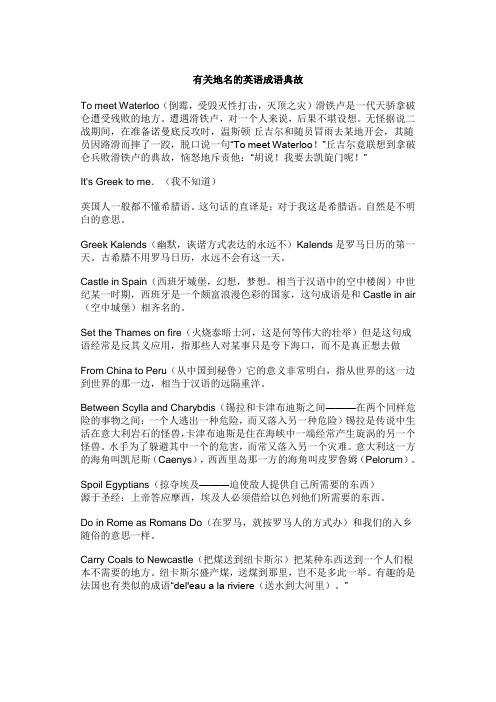
有关地名的英语成语典故To meet Waterloo(倒霉,受毁灭性打击,灭顶之灾)滑铁卢是一代天骄拿破仑遭受残败的地方。
遭遇滑铁卢,对一个人来说,后果不堪设想。
无怪据说二战期间,在准备诺曼底反攻时,温斯顿·丘吉尔和随员冒雨去某地开会,其随员因路滑而摔了一跤,脱口说一句“To meet Waterloo!”丘吉尔竟联想到拿破仑兵败滑铁卢的典故,恼怒地斥责他:“胡说!我要去凯旋门呢!”It's Greek to me.(我不知道)英国人一般都不懂希腊语。
这句话的直译是:对于我这是希腊语。
自然是不明白的意思。
Greek Kalends(幽默,诙谐方式表达的永远不)Kalends是罗马日历的第一天。
古希腊不用罗马日历,永远不会有这一天。
Castle in Spain(西班牙城堡,幻想,梦想。
相当于汉语中的空中楼阁)中世纪某一时期,西班牙是一个颇富浪漫色彩的国家,这句成语是和Castle in air (空中城堡)相齐名的。
Set the Thames on fire(火烧泰晤士河,这是何等伟大的壮举)但是这句成语经常是反其义应用,指那些人对某事只是夸下海口,而不是真正想去做From China to Peru(从中国到秘鲁)它的意义非常明白,指从世界的这一边到世界的那一边,相当于汉语的远隔重洋。
Between Scylla and Charybdis(锡拉和卡津布迪斯之间———在两个同样危险的事物之间:一个人逃出一种危险,而又落入另一种危险)锡拉是传说中生活在意大利岩石的怪兽,卡津布迪斯是住在海峡中一端经常产生旋涡的另一个怪兽。
水手为了躲避其中一个的危害,而常又落入另一个灾难。
意大利这一方的海角叫凯尼斯(Caenys),西西里岛那一方的海角叫皮罗鲁姆(Pelorum)。
Spoil Egyptians(掠夺埃及———迫使敌人提供自己所需要的东西)源于圣经:上帝答应摩西,埃及人必须借给以色列他们所需要的东西。
金城汤池 (jīn chéng tāng chí)-英文版成语典故
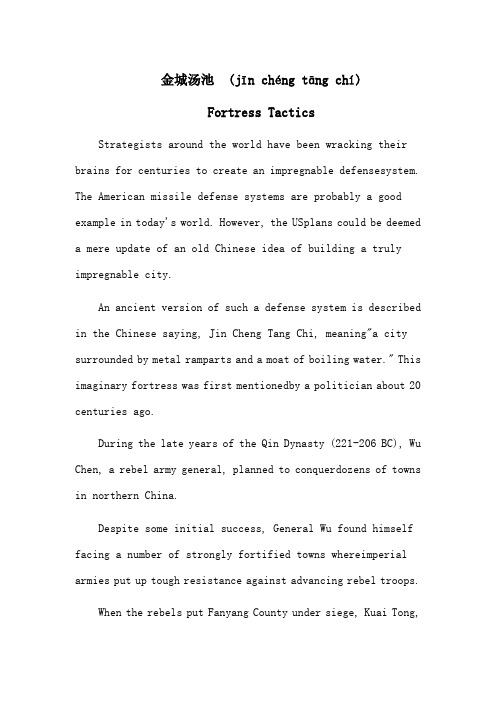
金城汤池(jīn chéng tāng chí)Fortress TacticsStrategists around the world have been wracking their brains for centuries to create an impregnable defensesystem. The American missile defense systems are probably a good example in today's world. However, the USplans could be deemed a mere update of an old Chinese idea of building a truly impregnable city.An ancient version of such a defense system is described in the Chinese saying, Jin Cheng Tang Chi, meaning"a city surrounded by metal ramparts and a moat of boiling water." This imaginary fortress was first mentionedby a politician about 20 centuries ago.During the late years of the Qin Dynasty (221-206 BC), Wu Chen, a rebel army general, planned to conquerdozens of towns in northern China.Despite some initial success, General Wu found himself facing a number of strongly fortified towns whereimperial armies put up tough resistance against advancing rebel troops.When the rebels put Fanyang County under siege, Kuai Tong,an eloquent politician, went to see themagistrate and convinced him that surrendering was the best way to get out of the predicament. Themagistrate agreed to give up only if the rebels would guarantee the safety of his family and himself.Kuai then called on the rebel General Wu. Kuai asked the general: "Do you intend to seize all the towns inHebei area?""Yes, I do," answered the general."At the moment, you could only take one town after another through fierce fighting. But I can tell you a way to grab all of them with just one strike."Kuai then told the general that his friend, the magistrate of Fanyang, was inclined to surrender to the rebels,but he was afraid that he would be killed like other Qin officers in fallen towns. Kuai suggested that the rebelgeneral spare the Fanyang magistrate's life and offer him good treatment after he surrendered. He said thiswould set a good example and encourage other Qin officials to follow suit."Otherwise," the persuader said, "the Qin troops will turn all the towns in the Hebei area into fortressesfortified with metal ramparts and moats of boiling water."Since then, the expression, Jin Cheng Tang Chi, has become a popular synonym for a city believed to beimpregnable.The rebel general followed the politician's advice and later seized more than 30 towns in northern Chinawithout another bloody battle.The teaching behind the imaginary impregnable city story, however, is that an invulnerable defense systemnever exists. It's only the people's will and their desire to survive that will turn a mound of earth into aninsurmountable mountain.。
中国成语故事邯郸学步双语版

中国成语故事邯郸学步双语版中国成语故事邯郸学步双语版Handan was the capital of the State of Zhao during the Warring States Period.邯郸,是战国时期赵国的首都。
A young man in the State of Yan heard that the State of Zhao was more powerful than the State of Yan, so he was much interested in the State of Zhao. Consequently, he crossed over mountain after mountain by himself and got to Handan.燕国有个青年听说赵国比燕国强大,对赵国很感兴趣。
于是,他一个人翻山越岭,来到了邯郸。
Upon arrival at Handan, he felt that the State of Zhao was indeed more stable than the State of Yan. Even the way of walking of the people of the State of Zhao looked better than that of the people of the State of Yan. He made up his mind to learn how the people of the State of Zhao walked in Handan, so that in the future the people of the State of Yan could walk as gracefully as them.到了邯郸,他觉得赵国确实比燕国安定,连赵国人走路的姿势都比燕国人好看。
- 1、下载文档前请自行甄别文档内容的完整性,平台不提供额外的编辑、内容补充、找答案等附加服务。
- 2、"仅部分预览"的文档,不可在线预览部分如存在完整性等问题,可反馈申请退款(可完整预览的文档不适用该条件!)。
- 3、如文档侵犯您的权益,请联系客服反馈,我们会尽快为您处理(人工客服工作时间:9:00-18:30)。
有关地名的英语成语典故
篇一:常用英语地名
countries
A
阿富汗Afghanistan
阿尔巴尼亚Albania
阿尔及利亚Algeria
安道尔Andorra
安哥拉Angola
安提瓜和巴布达Antiguaandbarbuda
阿根廷Argentina
亚美尼亚Armenia
澳大利亚Australia
奥地利Austria
阿塞摆疆Azerbaijan
b
巴哈马bahamas
巴林bahrain
孟加拉bangladesh
巴巴多斯barbados
白俄罗斯belarus
比利时belgium/xtrapage
伯利兹belize
贝宁benin
不丹bhutan
玻利维亚bolivia
波斯尼亚和黑塞哥维那bosniaandherzegovina 博茨瓦纳botswana
巴西brazil
文莱brunei
保加利亚bulgaria
布基纳法索burkinaFaso
布隆迪burundi
c
柬埔寨cambodia
喀麦隆cameroon
加拿大canada
佛得角capeVerde
中非centralAfricanRepublic
乍得chad
智利chile
中国china
哥伦比亚colombia
科摩罗comoros
刚果(金)congo(congo-Kinshasa)
刚果congo
哥斯达黎加costaRica
科特迪瓦coted'Ivoire
克罗地亚croatia
古巴cuba
塞浦路斯cyprus
捷克czech/前捷克斯洛伐克Formerczechoslovakia D
丹麦Denmark
吉布提Djibouti
多米尼克Dominica
多米尼加DominicanRepublic
e
东帝汶eastTimor
厄瓜多尔ecuador
埃及egypt
赤道几内亚equatorialguinea
厄立特里亚eritrea
爱沙尼亚estonia
埃塞俄比亚ethiopia
欧洲联盟europeanunion(eu)
F
斐济Fiji
芬兰Finland
法国France
g
加蓬gabon
冈比亚gambia
格鲁吉亚georgia
德国germany/前东德Formereastgermany 加纳ghana
希腊greece
格林纳达grenada
危地马拉guatemala
几内亚比绍guinea-bissau
几内亚guinea
圭亚那guyana
h
海地haiti
洪都拉斯honduras
匈牙利hungary
I
冰岛Iceland
印度India
印度尼西亚Indonesia
伊朗Iran
伊拉克Iraq
爱尔兰Ireland
以色列Israel
意大利Italy
J
牙买加Jamaica
日本Japan
约旦Jordan
K
哈萨克斯坦Kazakhstan 肯尼亚Kenya
基里巴斯Kiribati
朝鲜Korea(north)
韩国Korea(south)
科威特Kuwait
吉尔吉斯斯坦Kyrgyzstan
L
老挝Laos
拉脱维亚Latvia
黎巴嫩Lebanon
莱索托Lesotho
利比里亚Liberia
利比亚Libya
列支敦士登Liechtenstein 立陶宛Lithuania
卢森堡Luxembourg
m
马其顿macedonia
马达加斯加madagascar
马拉维malawi
马来西亚malaysia
马尔代夫maldives
马里mali
马尔他malta
马绍尔群岛marshallIslands 毛里塔尼亚mauritania
毛里求斯mauritius
墨西哥mexico
麦克罗尼西亚micronesia
摩尔多瓦moldova
摩纳哥monaco
蒙古mongolia
摩洛哥morocco
莫桑比克mozambique
缅甸myanmar
n
纳米比亚namibia
北大西洋公约组织northAtlanticTreatyorganization(nATo) 瑙鲁nauru
尼泊尔nepal
荷兰netherlands
新西兰newZealand
尼加拉瓜nicaragua
尼日尔niger
尼日利亚nigeria
挪威norway
o
阿曼oman
p
巴基斯坦pakistan
帕劳palau
巴勒斯坦palestine
巴拿马panama
巴布亚新几内亚papuanewguinea
巴拉圭paraguay
秘鲁peru
菲律宾philippines
波兰poland
葡萄牙portugal
Q
卡塔尔Qatar
R
罗马尼亚Romania
俄罗斯Russia/前苏联FormerussR
卢旺达Rwanda
s
圣基茨和尼维斯saintKitts-nevis
圣卢西亚saintLucia
圣文森特和格林纳丁斯saintVincentandthegrenadines 萨尔瓦多elsalvador
萨摩亚samoa。
